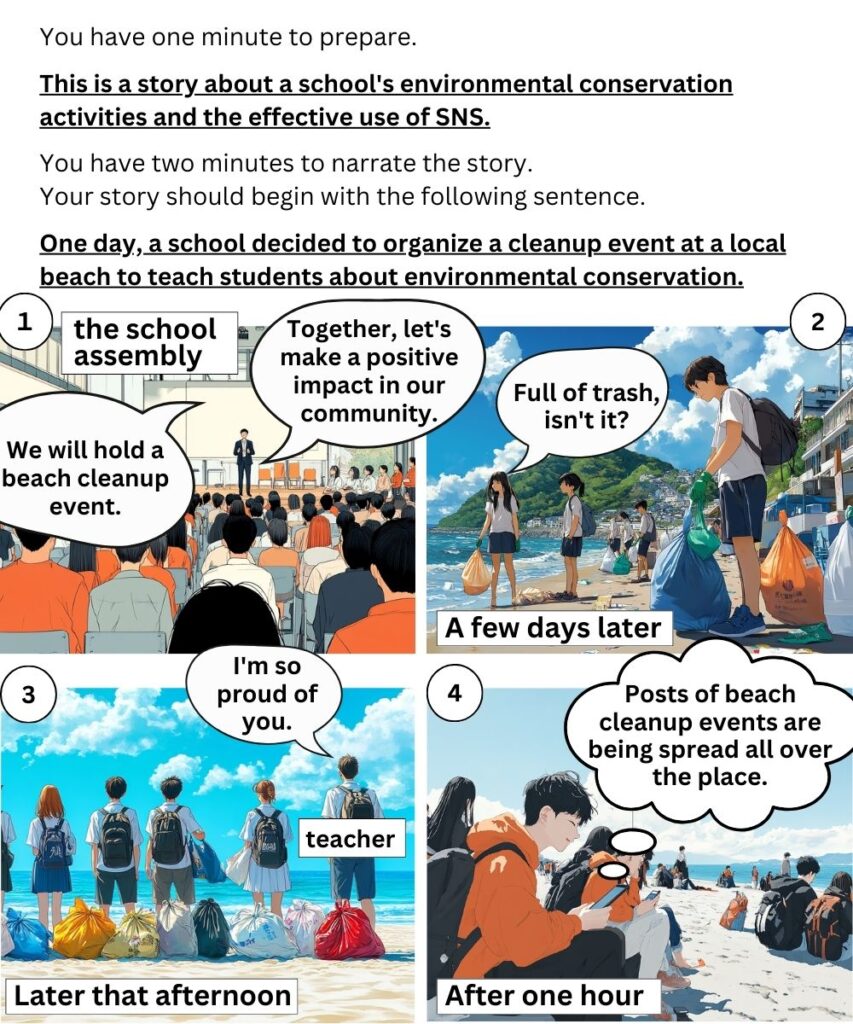実際の出題形式(問題カード)で英検準1級の面接練習を独学できるページです。
2024年度リニューアル対応!
所要時間:概ね8分
質問概要
ナレーション内容を考える(1分間)
イラストの内容を説明するナレーションを考える
ナレーション(2分間):ナレーションを始める
※2分以上続く場合は、途中でも中止させられるので注意
Q&A(No. 1):イラスト関連の質問
イラストに関連した質問。「問題カード」を見ながら解答できます。
※登場人物が考えている事などを聞かれます。
Q&A(No.2, No. 3)
問題カードに関連した、受験者の意見を問う質問
Q&A(No. 4)
問題カードのトピックに少し関係のある質問。受験者の意見を問う質問
※この<No. 4>質問文に「導入文」が追加されました。
問題カード

ナレーションと質問
ナレーション指示
<指示>Look at the pictures carefully and read the directions silently for one minute.(1分間)
<指示>Now, please begin your narration.(2分間)
Question No.1
Please look at the third picture. If you were the teacher, what would you be thinking?
Question No.2
Do you think that participating in community cleanup events can change students’ attitudes towards the environment?
Question No. 3
Do you think social media can play a significant role in promoting environmental activities like beach cleanups?
Question No.4
There is a growing number of people who believe that environmental education should be made a top priority. Do you think schools should incorporate more outdoor activities into their curriculum to promote environmental education?
質問音源チャレンジ
本番のように、英語の質問を聞いて答える練習をしてみましょう。
ナレーション準備
ナレーション開始
Question 1 mp3
Question 2 mp3
Question 3 mp3
Question 4 mp3
解答例
ナレーション例
<1> One day, a school decided to organize a cleanup event at a local beach to teach students about environmental conservation. The teachers announced the event at a school assembly, emphasizing the importance of preserving nature. They encouraged all students to participate and make a positive impact on their community.
ある日、学校は生徒たちに環境保護について教えるため、地元のビーチで清掃活動を企画した。教師たちは全校集会でこのイベントを発表し、自然の保護の重要性を強調した。彼らは全ての生徒が参加し、コミュニティに積極的な影響を与えることを奨励した。
「emphasize = 強調する」を他のいい方でもいくつか押さえておこう
1. highlight – 強調する、目立たせる
2. 2tress – 強調する、重点を置く
3. underline – 強調する、下線を引くように重要性を示す
4. accent – 強調する、目立たせる
<2> A few days later, the students gathered at the beach, equipped with gloves and trash bags. As they worked, one student remarked that it was shocking to see so much litter polluting the beautiful shoreline. Another student agreed, saying that they hadn’t realized the extent of the problem until now.
数日後、生徒たちは手袋とゴミ袋を持ってビーチに集まった。作業中、ある生徒は美しい海岸線にこれほどまでにゴミが散乱しているのは衝撃的だと述べた。別の生徒も同意し、これまで問題の深刻さに気づいていなかったと言った。
“equipped with” は、「~を装備している」「~を備えている」という意味で、何かを持っている、準備している状態を表す際に使われるよ
1. equip (動詞): 「装備する」「備える」
2. equipment (名詞): 「装備」「機器」
3. well-equipped (形容詞): 「十分な装備が整っている」
4. Under-equipped (形容詞): 「装備が不十分な」
Another student agreed, saying that they hadn’t realized the extent of the problem until now.
“the extent” は「範囲」や「程度」という意味で使われるね。この文では、問題の「程度」や「深刻さ」を表している。つまり、「the extent of the problem」は「問題の程度」や「問題がどれほど深刻であるか」という意味になるよ
<3> Later that afternoon, after hours of hard work, the beach was significantly cleaner. The students felt a sense of accomplishment as they gazed at the pristine sands. Their teacher praised their efforts, telling them that their actions had truly contributed to protecting the local environment.
その日の午後、数時間の努力の後、ビーチはかなりきれいになった。生徒たちは清らかな砂浜を見て達成感を感じた。彼らの教師はその努力を称賛し、彼らの行動が地元の環境保護に実際に貢献したと伝えた。
<4> After one hour, some of the students posted about the cleanup event on social media, and they received many “likes.” Inspired by this, other schools decided to organize similar events. The students felt proud and were motivated to continue participating in such meaningful activities.
1時間後、何人かの生徒がビーチの掃除イベントの様子をSNSに投稿したところ、たくさんの「いいね」がついた。これに触発されて、他の学校でも同様のイベントを開催することになった。生徒たちは誇りを感じ、今後もそのような意義ある活動に参加し続ける意欲を持った。
「meaningful activities = 意義ある活動」のように活動をほめる言葉をいくつか覚えておこう
1. productive discussions”(生産的な議論)
2. impactful initiatives”(影響力のある取り組み)
3. beneficial projects”(有益なプロジェクト)
4. engaging activities”(魅力的な活動)
5. valuable contributions”(貴重な貢献)
6. enriching experiences”(充実した経験)
7. “inspiring events”(感動的なイベント)
8. purposeful endeavors”(意義のある努力)
9. rewarding work”(やりがいのある仕事)
10. fulfilling activities”(充実感のある活動)
Question 1 解答例
質問:3枚目の写真を見てください。もしあなたが先生だったら、何を考えているでしょうか?
I would be thinking about how proud I am of my students for their dedication to cleaning up the beach. I might also consider how this experience could inspire them to become more environmentally conscious and take similar actions in the future.
生徒たちがビーチの清掃に熱心に取り組んでくれたことをとても誇りに思っているでしょう。また、この経験が彼らの環境意識を高め、将来も同様の行動を取るきっかけになるかもしれないと考えるかもしれません。
この質問では、先生の視点から生徒たちの努力を評価し、将来の行動について考えることが重要だね。単に誇りに思うだけでなく、環境意識の向上にも言及することで、より深い答えになるよ
Question 2 解答例
地域の清掃活動に参加することで、生徒の環境に対する態度が変わると思いますか?
Yes. Participating in community cleanup events can make students more aware of the impact of pollution and encourage them to take responsibility for their actions. Seeing the difference they can make firsthand can lead to a more proactive attitude towards protecting the environment.
はい。地域の清掃活動に参加することで、生徒は汚染の影響をより意識し、自分たちの行動に責任を持つようになると思います。自分たちが与える影響を目の当たりにすることで、環境保護に対してより積極的な態度が生まれるでしょう。
No. While participating in cleanup events can raise awareness temporarily, it may not lead to a lasting change in students’ attitudes. Without continuous education and reinforcement, students might return to their previous habits after the event is over.
いいえ。清掃活動に参加することで一時的に意識が高まるかもしれませんが、持続的な態度の変化にはつながらないかもしれません。継続的な教育と強化がないと、生徒たちは活動が終わった後、元の習慣に戻ってしまうかもしれません。
Question 3 解答例
ソーシャルメディアは、ビーチ清掃のような環境活動を推進する上で重要な役割を果たすと思いますか?
Yes. Social media can amplify the reach of environmental activities like beach cleanups by allowing participants to share their experiences with a wider audience. This can inspire others to join similar efforts and raise awareness about environmental issues on a larger scale.
はい。ソーシャルメディアは、ビーチ清掃のような環境活動の参加者が自分の経験を広く共有することで、その影響を拡大できます。これにより、他の人々が同様の活動に参加するよう促し、環境問題に対する意識をより広い範囲で高めることができます。
No. While social media can spread information quickly, it might not be as effective in promoting long-term commitment to environmental activities. Many people may “like” or share posts without taking any real action, leading to a false sense of participation.
いいえ。ソーシャルメディアは情報を迅速に広めることができる一方で、環境活動への長期的なコミットメントを促進する効果はそれほど高くないかもしれません。多くの人が「いいね」やシェアをするだけで実際の行動を起こさないため、参加しているという錯覚を引き起こす可能性があります。
Question 4 解答例
環境教育を最優先事項とするべきだという人が増えています。環境教育を促進するために、学校はもっと野外活動をカリキュラムに取り入れるべきだと思いますか?
Yes. Incorporating more outdoor activities into the curriculum can provide students with hands-on learning experiences that deepen their understanding of environmental issues. These activities can also foster a stronger connection to nature, encouraging students to care more about the environment.
はい。カリキュラムにアウトドアアクティビティを多く取り入れることで、環境問題への理解を深める実践的な学習体験を得ることができます。これらの活動は自然との結びつきを強め、生徒が環境を大切にする気持ちを育むのにも役立ちます。
No. While outdoor activities can be beneficial, it might be challenging to fit them into an already packed curriculum. Schools should focus on integrating environmental education into existing subjects rather than adding more activities that could overwhelm students.
いいえ。野外活動は有益な場合もありますが、既に詰め込まれているカリキュラムに組み込むのは難しいかもしれません。学校は、生徒を圧倒する可能性のある活動を追加するのではなく、環境教育を既存の科目に統合することに焦点を当てるべきです。
面接練習はask本校にお尋ねください:無料体験レッスン予約
こちらの投稿もおススメです:英検準1級面接対策|AIとビジネスに関する最新問題カードつき
環境保護ジョーク
ジョーク 1
Original: Why did the student bring a ladder to the environmental club meeting?
Answer: Because they heard the meeting was about “reaching new heights” in sustainability!
日本語訳: なぜ学生は環境クラブの会議に梯子を持ってきたのですか?
答え: 会議が「持続可能性で新しい高みに到達する」ことについてだと聞いたからです!
解説: 「reaching new heights」は「新たな高みを目指す」という意味の比喩ですが、学生がその言葉を文字通り「高い場所に到達する」と解釈し、梯子を持ってきたというユーモアです。
ジョーク 2
Original: What do you call a group of students who plant trees together?
Answer: The “Root Squad”!
日本語訳: 木を一緒に植える学生のグループを何と呼びますか?
答え: 「ルート・スクワッド」!(根っこのチーム)
解説: 「Root Squad」は「根っこ(root)」と「チーム(squad)」を組み合わせた言葉で、木を植える活動をしている学生たちのグループを楽しく表現したものです。
ジョーク 3
Original: Why did the environmental studies student refuse to use plastic straws?
Answer: Because they wanted to “suck less”!
日本語訳: なぜ環境学の学生はプラスチックのストローを使わなかったのですか?
答え: 彼らは「環境への影響を減らしたかった(suck less)」からです!
解説: 「suck less」は「影響を少なくする」という意味と、「ストローで吸う(suck)」という意味をかけています。プラスチックのストローを使わないことで、環境への悪影響を減らすというジョークです。
ジョーク 4
Original: How do environmental science students stay cool during a heatwave?
Answer: They keep it “green” with lots of shade from the trees they planted!
日本語訳: 環境科学の学生は、熱波の時どうやって涼しく過ごすのですか?
答え: 彼らが植えた木々のたくさんの木陰で「グリーン」を保つのです!
解説: 「keep it green」は、環境に優しい行動をするという意味ですが、ここでは植えた木々の影で涼しくなるというダブルミーニングになっています。
ジョーク 5
Original: Why don’t environmentalists tell secrets in the forest?
Answer: Because the trees have too many “leaves”!
日本語訳: なぜ環境保護活動家は森で秘密を話さないのですか?
答え: 木々には「葉っぱ(leaves)」が多すぎるからです!
解説: 「Leaves」は「葉っぱ」という意味ですが、「leave」は「去る」という意味の同音異義語でもあります。「秘密を話しても、木々が去ってしまう(秘密が漏れる)」というジョークです。
ジョーク 6
Original: What did the recycling bin say to the soda can?
Answer: “You can be anything you want, if you just recycle!”
日本語訳: リサイクル箱がソーダ缶に何と言ったと思いますか?
答え: 「リサイクルすれば、何にでもなれるよ!」
解説: このジョークは、リサイクルすることでソーダ缶が他の製品に生まれ変わる可能性を擬人化して伝えるものです。「You can」は「あなたは~できる」と「缶(can)」の言葉遊びも含まれています。
ジョーク 7
Original: Why are environmentalists so good at playing cards?
Answer: Because they always play their “cards” right by reducing, reusing, and recycling!
日本語訳: なぜ環境保護活動家はカードゲームが得意なのですか?
答え: 減らす、再利用する、リサイクルすることで、いつも「上手にカードを切る」からです!
解説: 「play their cards right」というフレーズは「うまく立ち回る」という意味があります。ここでは、環境保護活動家が3R(リデュース、リユース、リサイクル)を実践することで、うまく行動することを表現しています。




